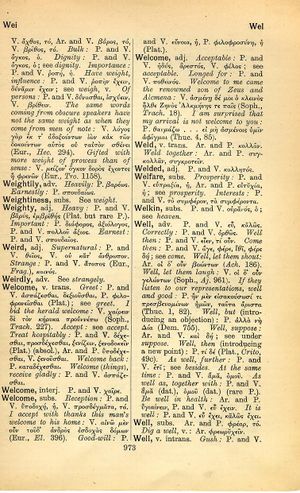welcome: Difference between revisions
στάζει γὰρ αὖ μοι φοίνιον τόδ᾽ἐκ βυθοῦ κηκῖον αἷμα → blood oozing from the deep wound, bloody gore drops oozing from the depths of my wound
(CSV5) |
m (Woodhouse1 replacement) |
||
| Line 1: | Line 1: | ||
{{Woodhouse1 | {{Woodhouse1 | ||
|Text=[[File:woodhouse_973.jpg|thumb|link={{filepath:woodhouse_973.jpg}}]] | |Text=[[File:woodhouse_973.jpg|thumb|link={{filepath:woodhouse_973.jpg}}]] | ||
===verb transitive=== | |||
[[greet]]: [[prose|P.]] and [[verse|V.]] [[ἀσπάζεσθαι]], [[δεξιοῦσθαι]], [[prose|P.]] [[φιλοφρονεῖσθαι]] ([[Plato]]); see [[greet]]. | |||
[[I bid the herald welcome]]: [[verse|V.]] [[χαίρω]], [[χαίρειν δὲ τὸν κήρυκα προὐννέπω]] ([[Sophocles|Soph.]], ''[[Trachiniae]]'' 227). | |||
[[accept]]: see [[accept]]. | |||
[[treat hospitably]]: [[prose|P.]] and [[verse|V.]] [[δέχομαι]], [[δέχεσθαι]], [[προσδέχεσθαι]], [[ξενίζειν]], [[ξενοδοκεῖν]] ([[Plato]]) (absol.), [[Aristophanes|Ar.]] and [[prose|P.]] [[ὑποδέχεσθαι]], [[verse|V.]] [[ξενοῦσθαι]]. | |||
[[welcome back]]: [[prose|P.]] [[καταδέχεσθαι]]. | |||
[[welcome (things)]], [[receive gladly]]: [[prose|P.]] and [[verse|V.]] [[ἀσπάζεσθαι]]. | |||
===interjection=== | |||
P. and V. χαῖρε. | [[prose|P.]] and [[verse|V.]] [[χαῖρε]]. | ||
===substantive=== | |||
[[reception]]: [[prose|P.]] and [[verse|V.]] [[ὑποδοχή]], ἡ, [[verse|V.]] [[προσδέγματα]], τά. | |||
[[I accept with thanks this man's welcome to his home]]: [[verse|V.]] [[αἰνῶ μὲν οὖν τοῦδ' ἀνδρὸς ἐσδοχὰς δόμων]] ([[Euripides|Eur.]], ''[[Electra]]'' 396). | |||
[[good-will]]: [[prose|P.]] and [[verse|V.]] [[εὔνοια]], ἡ, [[prose|P.]] [[φιλοφροσύνη]], ἡ ([[Plato]]). | |||
===adjective=== | |||
[[acceptable]]: [[prose|P.]] and [[verse|V.]] [[ἡδύς]], [[ἀρεστός]], [[verse|V.]] [[φίλος]]; see [[acceptable]]. | |||
[[longed for]]: [[prose|P.]] and [[verse|V.]] [[ποθεινός]]. | |||
[[welcome to me came the renowned son of Zeus and Alcmena]]: [[verse|V.]] [[ἀσμένῃ δέ μοι ὁ κλεινὸς ἦλθε Ζηνὸς Ἀλκμήνης τε παῖς]] ([[Sophocles|Soph.]], ''[[Trachiniae]]'' 18). | |||
[[I am surprised that my arrival is not welcome to you]]: [[prose|P.]] [[θαυμάζω… εἰ μὴ ἀσμένοις ὑμῖν ἀφῖγμαι]] ([[Thucydides|Thuc.]] 4, 85). | |||
}} | }} | ||
Revision as of 08:49, 20 May 2020
English > Greek (Woodhouse)
verb transitive
greet: P. and V. ἀσπάζεσθαι, δεξιοῦσθαι, P. φιλοφρονεῖσθαι (Plato); see greet.
I bid the herald welcome: V. χαίρω, χαίρειν δὲ τὸν κήρυκα προὐννέπω (Soph., Trachiniae 227).
treat hospitably: P. and V. δέχομαι, δέχεσθαι, προσδέχεσθαι, ξενίζειν, ξενοδοκεῖν (Plato) (absol.), Ar. and P. ὑποδέχεσθαι, V. ξενοῦσθαι.
welcome back: P. καταδέχεσθαι.
welcome (things), receive gladly: P. and V. ἀσπάζεσθαι.
interjection
substantive
reception: P. and V. ὑποδοχή, ἡ, V. προσδέγματα, τά.
I accept with thanks this man's welcome to his home: V. αἰνῶ μὲν οὖν τοῦδ' ἀνδρὸς ἐσδοχὰς δόμων (Eur., Electra 396).
good-will: P. and V. εὔνοια, ἡ, P. φιλοφροσύνη, ἡ (Plato).
adjective
acceptable: P. and V. ἡδύς, ἀρεστός, V. φίλος; see acceptable.
longed for: P. and V. ποθεινός.
welcome to me came the renowned son of Zeus and Alcmena: V. ἀσμένῃ δέ μοι ὁ κλεινὸς ἦλθε Ζηνὸς Ἀλκμήνης τε παῖς (Soph., Trachiniae 18).
I am surprised that my arrival is not welcome to you: P. θαυμάζω… εἰ μὴ ἀσμένοις ὑμῖν ἀφῖγμαι (Thuc. 4, 85).

